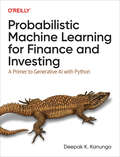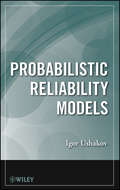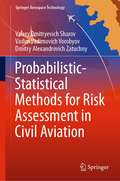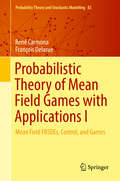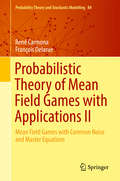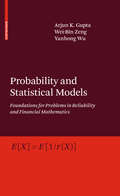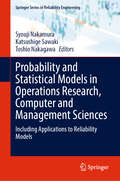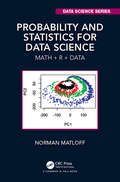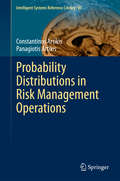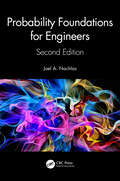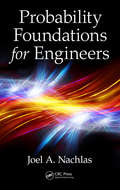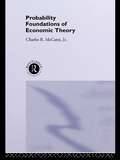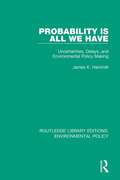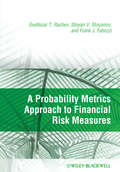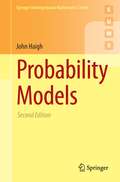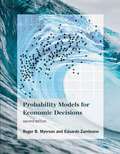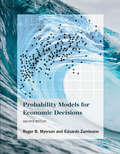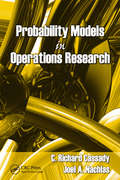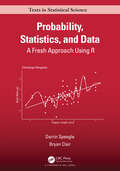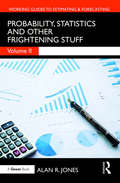- Table View
- List View
Proaktive Polizeiarbeit als Führungs- und Managementaufgabe: Grundlagen - Praxis - Perspektiven
by Christian BarthelDieser Sammelband zeigt, wie Bürgerorientierung und proaktive Polizeiarbeit im Organisationsalltag der Dienststellen wirksam und vor allem auf Dauer sichergestellt werden können. Beides gehört heute zum Selbstverständnis der Polizei, dennoch spielt Prävention im Alltag polizeilicher Dienststellen oft genug eine Nebenrolle. Zuspitzend könnte man sagen: Die Rede von der Bürgerorientierung dient mitunter zur Dekoration der Außen- und Schauseite der Organisation und die operative Beschäftigung mit der konkreten Präventionsarbeit, dem Dialog mit Bürgern und Sicherheitspartnern wird an die stellenmäßig gering ausgestatteten Kontaktbereichsbeamten delegiert. Die Autoren machen in ihren Beiträgen deutlich, wie entscheidend Führung für den Erfolg bürgerorientierter Polizeiarbeit ist. Führung und Management auf der Leitungsebene von Polizeiinspektionen, Revieren, Kommissariaten – also den Basisorganisationseinheiten der Polizei in der Fläche - sind die Bedingungen der Möglichkeit einer bürgerorientierten, präventiven und proaktiven Polizeiarbeit. Die Führungskräfte des Höheren Dienstes müssen die treibende Kraft für die strategische Ausrichtung und Entwicklung der Dienststelle sein, die erst die Bürgerorientierung als klugen Mix des gesamten polizeilichen Interventionsrepertoires gewährleistet.
Probabilistic Machine Learning for Finance and Investing: A Primer to Generative AI with Python
by Deepak K. KanungoThere are several reasons why probabilistic machine learning represents the next-generation ML framework and technology for finance and investing. This generative ensemble learns continually from small and noisy financial datasets while seamlessly enabling probabilistic inference, retrodiction, prediction, and counterfactual reasoning. Probabilistic ML also lets you systematically encode personal, empirical, and institutional knowledge into ML models.Whether they're based on academic theories or ML strategies, all financial models are subject to modeling errors that can be mitigated but not eliminated. Probabilistic ML systems treat uncertainties and errors of financial and investing systems as features, not bugs. And they quantify uncertainty generated from inexact inputs and outputs as probability distributions, not point estimates. This makes for realistic financial inferences and predictions that are useful for decision-making and risk management.Unlike conventional AI, these systems are capable of warning us when their inferences and predictions are no longer useful in the current market environment. By moving away from flawed statistical methodologies and a restrictive conventional view of probability as a limiting frequency, you’ll move toward an intuitive view of probability as logic within an axiomatic statistical framework that comprehensively and successfully quantifies uncertainty. This book shows you how.
Probabilistic Reliability Models
by Igor A. UshakovPractical Approaches to Reliability Theory in Cutting-Edge ApplicationsProbabilistic Reliability Models helps readers understand and properly use statistical methodsand optimal resource allocation to solve engineering problems.The author supplies engineers with a deeper understanding of mathematical models while alsoequipping mathematically oriented readers with a fundamental knowledge of the engineeringrelatedapplications at the center of model building. The book showcases the use of probabilitytheory and mathematical statistics to solve common, real-world reliability problems. Followingan introduction to the topic, subsequent chapters explore key systems and models including:* Unrecoverable objects and recoverable systems* Methods of direct enumeration* Markov models and heuristic models* Performance effectiveness* Time redundancy* System survivability* Aging units and their related systems* Multistate systemsDetailed case studies illustrate the relevance of the discussed methods to real-world technicalprojects including software failure avalanches, gas pipelines with underground storage, andintercontinental ballistic missile (ICBM) control systems. Numerical examples and detailedexplanations accompany each topic, and exercises throughout allow readers to test theircomprehension of the presented material.Probabilistic Reliability Models is an excellent book for statistics, engineering, and operationsresearch courses on applied probability at the upper-undergraduate and graduate levels. Thebook is also a valuable reference for professionals and researchers working in industry whowould like a mathematical review of reliability models and the relevant applications.
Probabilistic-Statistical Methods for Risk Assessment in Civil Aviation (Springer Aerospace Technology)
by Valery Dmitryevich Sharov Vadim Vadimovich Vorobyov Dmitry Alexandrovich ZatuchnyThis book analyses the models for major risks related to flight safety in the aviation sector and presents risk estimation methods through examples of several known aviation enterprises. The book provides a comprehensive content for professionals engaged in the development of flight safety regulatory framework as well as in the design and operation of ground-based or on-board flight support radio electronic systems. The book is also useful for senior students and postgraduates in aviation specialties, especially those related to air traffic management.
Probabilistic Theory of Mean Field Games with Applications I: Mean Field FBSDEs, Control, and Games (Probability Theory and Stochastic Modelling #83)
by François Delarue René CarmonaThis two-volume book offers a comprehensive treatment of the probabilistic approach to mean field game models and their applications. The book is self-contained in nature and includes original material and applications with explicit examples throughout, including numerical solutions.Volume I of the book is entirely devoted to the theory of mean field games without a common noise. The first half of the volume provides a self-contained introduction to mean field games, starting from concrete illustrations of games with a finite number of players, and ending with ready-for-use solvability results. Readers are provided with the tools necessary for the solution of forward-backward stochastic differential equations of the McKean-Vlasov type at the core of the probabilistic approach. The second half of this volume focuses on the main principles of analysis on the Wasserstein space. It includes Lions' approach to the Wasserstein differential calculus, and the applications of its results to the analysis of stochastic mean field control problems. Together, both Volume I and Volume II will greatly benefit mathematical graduate students and researchers interested in mean field games. The authors provide a detailed road map through the book allowing different access points for different readers and building up the level of technical detail. The accessible approach and overview will allow interested researchers in the applied sciences to obtain a clear overview of the state of the art in mean field games.
Probabilistic Theory of Mean Field Games with Applications II: Mean Field Games with Common Noise and Master Equations (Probability Theory and Stochastic Modelling #84)
by François Delarue René CarmonaThis two-volume book offers a comprehensive treatment of the probabilistic approach to mean field game models and their applications. The book is self-contained in nature and includes original material and applications with explicit examples throughout, including numerical solutions. Volume II tackles the analysis of mean field games in which the players are affected by a common source of noise. The first part of the volume introduces and studies the concepts of weak and strong equilibria, and establishes general solvability results. The second part is devoted to the study of the master equation, a partial differential equation satisfied by the value function of the game over the space of probability measures. Existence of viscosity and classical solutions are proven and used to study asymptotics of games with finitely many players. Together, both Volume I and Volume II will greatly benefit mathematical graduate students and researchers interested in mean field games. The authors provide a detailed road map through the book allowing different access points for different readers and building up the level of technical detail. The accessible approach and overview will allow interested researchers in the applied sciences to obtain a clear overview of the state of the art in mean field games.
Probability and Statistical Models
by Arjun K. Gupta Yanhong Wu Wei-Bin ZengWith an emphasis on models and techniques, this textbook introduces many of the fundamental concepts of stochastic modeling that are now a vital component of almost every scientific investigation. In particular, emphasis is placed on laying the foundation for solving problems in reliability, insurance, finance, and credit risk. The material has been carefully selected to cover the basic concepts and techniques on each topic, making this an ideal introductory gateway to more advanced learning. With exercises and solutions to selected problems accompanying each chapter, this textbook is for a wide audience including advanced undergraduate and beginning-level graduate students, researchers, and practitioners in mathematics, statistics, engineering, and economics.
Probability and Statistical Models in Operations Research, Computer and Management Sciences: Including Applications to Reliability Models (Springer Series in Reliability Engineering)
by Syouji Nakamura Katsushige Sawaki Toshio NakagawaThis book explores the convergence of stochastic modeling, reliability tools, and the quest for solutions in an era of globalized challenges. The tools have become only more important in the unforeseen emergencies such as the COVID-19 pandemic and the conflict in Ukraine. This comprehensive book is an invaluable resource for graduate students seeking practical knowledge on probability and statistics in real-world applications. The book is divided into four parts: reliability, computer science, management science, and operations research. Each part includes surveys, recent results, and tools used. Moreover, it offers an essential reference point for researchers, engineers, and managers operating in laboratories, industries, businesses, and government agencies. Through the exchange of academic achievements, ideas, and discussions, this book serves as a catalyst for progress and innovation.
Probability and Statistics for Data Science: Math + R + Data (Chapman & Hall/CRC Data Science Series)
by Norman MatloffProbability and Statistics for Data Science: Math + R + Data covers "math stat"—distributions, expected value, estimation etc.—but takes the phrase "Data Science" in the title quite seriously: <P><P> * Real datasets are used extensively. * All data analysis is supported by R coding. * Includes many Data Science applications, such as PCA, mixture distributions, random graph models, Hidden Markov models, linear and logistic regression, and neural networks. * Leads the student to think critically about the "how" and "why" of statistics, and to "see the big picture." * Not "theorem/proof"-oriented, but concepts and models are stated in a mathematically precise manner. <P><P> Prerequisites are calculus, some matrix algebra, and some experience in programming. <P><P> Norman Matloff is a professor of computer science at the University of California, Davis, and was formerly a statistics professor there. He is on the editorial boards of the Journal of Statistical Software and The R Journal. His book Statistical Regression and Classification: From Linear Models to Machine Learning was the recipient of the Ziegel Award for the best book reviewed in Technometrics in 2017. He is a recipient of his university's Distinguished Teaching Award.
Probability and Statistics for Finance
by Rachev Svetlozar T. Markus Hoechstoetter Fabozzi Frank J. Focardi Sergio M.A comprehensive look at how probability and statistics is applied to the investment process Finance has become increasingly more quantitative, drawing on techniques in probability and statistics that many finance practitioners have not had exposure to before. In order to keep up, you need a firm understanding of this discipline. Probability and Statistics for Finance addresses this issue by showing you how to apply quantitative methods to portfolios, and in all matter of your practices, in a clear, concise manner. Informative and accessible, this guide starts off with the basics and builds to an intermediate level of mastery. * Outlines an array of topics in probability and statistics and how to apply them in the world of finance * Includes detailed discussions of descriptive statistics, basic probability theory, inductive statistics, and multivariate analysis * Offers real-world illustrations of the issues addressed throughout the text The authors cover a wide range of topics in this book, which can be used by all finance professionals as well as students aspiring to enter the field of finance.
Probability Distributions
by Michael Parzen Paul J. HamiltonThis technical note introduces students to the concept of random variables, and from there the normal and binomial distributions. After a brief introduction to random variables, the note describes the standard properties of the normal distribution: a single peak, and a symmetric, bell-shaped curve. Students observe the 68-95-99.7 rule, and see how the distribution changes with different values of the mean and standard deviation parameters. Finally, the note demonstrates how probability calculations based on the normal distribution can be done in the R programming language, and how random data can be simulated from a normal curve in R. The note then describes the standard properties of the binomial distribution, and similarly shows how binomial calculations can be performed in R.
Probability Distributions in Risk Management Operations
by Constantinos Artikis Panagiotis ArtikisThis book is about the formulations, theoretical investigations, and practical applications of new stochastic models for fundamental concepts and operations of the discipline of risk management. It also examines how these models can be useful in the descriptions, measurements, evaluations, and treatments of risks threatening various modern organizations. Moreover, the book makes clear that such stochastic models constitute very strong analytical tools which substantially facilitate strategic thinking and strategic decision making in many significant areas of risk management. In particular the incorporation of fundamental probabilistic concepts such as the sum, minimum, and maximum of a random number of continuous, positive, independent, and identically distributed random variables in the mathematical structure of stochastic models significantly supports the suitability of these models in the developments, investigations, selections, and implementations of proactive and reactive risk management operations. The book makes extensive use of integral and differential equations of characteristic functions, mainly corresponding to important classes of mixtures of probability distributions, as powerful analytical tools for investigating the behavior of new stochastic models suitable for the descriptions and implementations of fundamental risk control and risk financing operations. These risk treatment operations very often arise in a wide variety of scientific disciplines of extreme practical importance.
Probability for Finance
by Ekkehard Kopp Jan Malczak Tomasz ZastawniakStudents and instructors alike will benefit from this rigorous, unfussy text, which keeps a clear focus on the basic probabilistic concepts required for an understanding of financial market models, including independence and conditioning. Assuming only some calculus and linear algebra, the text develops key results of measure and integration, which are applied to probability spaces and random variables, culminating in central limit theory. Consequently it provides essential prerequisites to graduate-level study of modern finance and, more generally, to the study of stochastic processes. Results are proved carefully and the key concepts are motivated by concrete examples drawn from financial market models. Students can test their understanding through the large number of exercises and worked examples that are integral to the text.
Probability Foundations for Engineers
by Joel A. NachlasThis textbook will continue to be the best suitable textbook written specifically for a first course on probability theory and designed for industrial engineering and operations management students. The book offers theory in an accessible manner and includes numerous practical examples based on engineering applications. Probability Foundations for Engineers, Second Edition continues to focus specifically on probability rather than probability and statistics. It offers a conversational presentation rather than a theorem or proof and includes examples based on engineering applications as it highlights Excel computations. This new edition presents a review of set theory and updates all descriptions, such as events versus outcomes, so that they are more understandable. Additional new material includes distributions such as beta and lognormal, a section on counting principles for defining probabilities, a section on mixture distributions and a pair of distribution summary tables. Intended for undergraduate engineering students, this new edition textbook offers a foundational knowledge of probability. It is also useful to engineers already in the field who want to learn more about probability concepts. An updated solutions manual is available for qualified textbook adoptions.
Probability Foundations for Engineers
by Joel A. NachlasSuitable for a first course in probability theory, this textbook covers theory in an accessible manner and includes numerous practical examples based on engineering applications. The book begins with a summary of set theory and then introduces probability and its axioms. It covers conditional probability, independence, and approximations. An important aspect of the text is the fact that examples are not presented in terms of "balls in urns". Many examples do relate to gambling with coins, dice and cards but most are based on observable physical phenomena familiar to engineering students.
Probability Foundations of Economic Theory
by Charles McCannFirst published in 1994. Routledge is an imprint of Taylor & Francis, an informa company.
Probability in Economics (Routledge Frontiers of Political Economy #5)
by Omar Hamouda Robin RowleyNotions of probability and uncertainty have been increasingly prominant in modern economics. This book considers the philosophical and practical difficulties inherent in integrating these concepts into realistic economic situations. It outlines and evaluates the major developments, indicating where further work is needed. This book addresses: * probability, utility and rationality within current economic thought and practice * concepts of ignorance and indeterminancy * experimental economics * econometrics, with particular reference inference and estimation.
Probability is All We Have: Uncertainties, Delays, and Environmental Policy Making (Routledge Library Editions: Environmental Policy #10)
by James K. HammittFirst published in 1990. In this study, the author suggests ways that policy-makers can think about environmental policy choice that responds to the importance of uncertainty and delay. Hammitt describes several tools for environmental policy analysis and illustrates their application to important policy issues. In the first part of the book, dealing with stratospheric-ozone depletion, the author describes techniques for accommodating outcome uncertainties. The second part of the study considers the health risks associated with pesticide residues on food. The final section addresses the issue of potential global climate change, and describes how the tools explored can be applied to this new challenge. This book should be of greatest interest to academic, government, and industry analysts and others concerned with improving methods for environmental-policy making.
A Probability Metrics Approach to Financial Risk Measures
by Svetlozar T. Rachev Stoyan V. Stoyanov Frank J. FabozziA Probability Metrics Approach to Financial Risk Measures relates the field of probability metrics and risk measures to one another and applies them to finance for the first time. Helps to answer the question: which risk measure is best for a given problem? Finds new relations between existing classes of risk measures Describes applications in finance and extends them where possible Presents the theory of probability metrics in a more accessible form which would be appropriate for non-specialists in the field Applications include optimal portfolio choice, risk theory, and numerical methods in finance Topics requiring more mathematical rigor and detail are included in technical appendices to chapters
Probability Models
by John HaighThe purpose of this book is to provide a sound introduction to the study of real-world phenomena that possess random variation. It describes how to set up and analyse models of real-life phenomena that involve elements of chance. Motivation comes from everyday experiences of probability, such as that of a dice or cards, the idea of fairness in games of chance, and the random ways in which, say, birthdays are shared or particular events arise. Applications include branching processes, random walks, Markov chains, queues, renewal theory, and Brownian motion. This popular second edition textbook contains many worked examples and several chapters have been updated and expanded. Some mathematical knowledge is assumed. The reader should have the ability to work with unions, intersections and complements of sets; a good facility with calculus, including integration, sequences and series; and appreciation of the logical development of an argument. Probability Models is designed to aid students studying probability as part of an undergraduate course on mathematics or mathematics and statistics.
Probability Models for Economic Decisions (The MIT Press)
by Roger B. Myerson Eduardo ZambranoAn introduction to the use of probability models for analyzing risk and economic decisions, using spreadsheets to represent and simulate uncertainty.This textbook offers an introduction to the use of probability models for analyzing risks and economic decisions. It takes a learn-by-doing approach, teaching the student to use spreadsheets to represent and simulate uncertainty and to analyze the effect of such uncertainty on an economic decision. Students in applied business and economics can more easily grasp difficult analytical methods with Excel spreadsheets. The book covers the basic ideas of probability, how to simulate random variables, and how to compute conditional probabilities via Monte Carlo simulation. The first four chapters use a large collection of probability distributions to simulate a range of problems involving worker efficiency, market entry, oil exploration, repeated investment, and subjective belief elicitation. The book then covers correlation and multivariate normal random variables; conditional expectation; optimization of decision variables, with discussions of the strategic value of information, decision trees, game theory, and adverse selection; risk sharing and finance; dynamic models of growth; dynamic models of arrivals; and model risk. New material in this second edition includes two new chapters on additional dynamic models and model risk; new sections in every chapter; many new end-of-chapter exercises; and coverage of such topics as simulation model workflow, models of probabilistic electoral forecasting, and real options. The book comes equipped with Simtools, an open-source, free software used througout the book, which allows students to conduct Monte Carlo simulations seamlessly in Excel.
Probability Models for Economic Decisions, second edition (The\mit Press Ser.)
by Roger B. Myerson Eduardo ZambranoAn introduction to the use of probability models for analyzing risk and economic decisions, using spreadsheets to represent and simulate uncertainty.This textbook offers an introduction to the use of probability models for analyzing risks and economic decisions. It takes a learn-by-doing approach, teaching the student to use spreadsheets to represent and simulate uncertainty and to analyze the effect of such uncertainty on an economic decision. Students in applied business and economics can more easily grasp difficult analytical methods with Excel spreadsheets. The book covers the basic ideas of probability, how to simulate random variables, and how to compute conditional probabilities via Monte Carlo simulation. The first four chapters use a large collection of probability distributions to simulate a range of problems involving worker efficiency, market entry, oil exploration, repeated investment, and subjective belief elicitation. The book then covers correlation and multivariate normal random variables; conditional expectation; optimization of decision variables, with discussions of the strategic value of information, decision trees, game theory, and adverse selection; risk sharing and finance; dynamic models of growth; dynamic models of arrivals; and model risk. New material in this second edition includes two new chapters on additional dynamic models and model risk; new sections in every chapter; many new end-of-chapter exercises; and coverage of such topics as simulation model workflow, models of probabilistic electoral forecasting, and real options. The book comes equipped with Simtools, an open-source, free software used througout the book, which allows students to conduct Monte Carlo simulations seamlessly in Excel.
Probability Models in Operations Research (Operations Research Series)
by C. Richard Cassady Joel A. NachlasIndustrial engineering has expanded from its origins in manufacturing to transportation, health care, logistics, services, and more. A common denominator among all these industries, and one of the biggest challenges facing decision-makers, is the unpredictability of systems. Probability Models in Operations Research provides a comprehensive
Probability, Statistics, and Data: A Fresh Approach Using R (Chapman & Hall/CRC Texts in Statistical Science)
by Darrin Speegle Bryan ClairThis book is a fresh approach to a calculus based, first course in probability and statistics, using R throughout to give a central role to data and simulation. The book introduces probability with Monte Carlo simulation as an essential tool. Simulation makes challenging probability questions quickly accessible and easily understandable. Mathematical approaches are included, using calculus when appropriate, but are always connected to experimental computations. Using R and simulation gives a nuanced understanding of statistical inference. The impact of departure from assumptions in statistical tests is emphasized, quantified using simulations, and demonstrated with real data. The book compares parametric and non-parametric methods through simulation, allowing for a thorough investigation of testing error and power. The text builds R skills from the outset, allowing modern methods of resampling and cross validation to be introduced along with traditional statistical techniques. Fifty-two data sets are included in the complementary R package fosdata. Most of these data sets are from recently published papers, so that you are working with current, real data, which is often large and messy. Two central chapters use powerful tidyverse tools (dplyr, ggplot2, tidyr, stringr) to wrangle data and produce meaningful visualizations. Preliminary versions of the book have been used for five semesters at Saint Louis University, and the majority of the more than 400 exercises have been classroom tested.
Probability, Statistics and Other Frightening Stuff (Working Guides to Estimating & Forecasting #2)
by Alan R. JonesProbability, Statistics and Other Frightening Stuff (Volume II of the Working Guides to Estimating & Forecasting series) considers many of the commonly used Descriptive Statistics in the world of estimating and forecasting. It considers values that are representative of the ‘middle ground’ (Measures of Central Tendency), and the degree of data scatter (Measures of Dispersion and Shape) around the ‘middle ground’ values. A number of Probability Distributions and where they might be used are discussed, along with some fascinating and useful ‘rules of thumb’ or short-cut properties that estimators and forecasters can exploit in plying their trade. With the help of a ‘Correlation Chicken’, the concept of partial correlation is explained, including how the estimator or forecaster can exploit this in reflecting varying levels of independence and imperfect dependence between an output or predicted value (such as cost) and an input or predictor variable such as size. Under the guise of ‘Tails of the unexpected’ the book concludes with two chapters devoted to Hypothesis Testing (or knowing when to accept or reject the validity of an assumed estimating relationship), and a number of statistically-based tests to help the estimator to decide whether to include or exclude a data point as an ‘outlier’, one that appears not to be representative of that which the estimator is tasked to produce. This is a valuable resource for estimators, engineers, accountants, project risk specialists as well as students of cost engineering.

